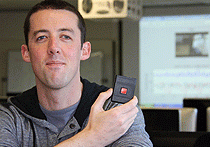Fresh idea foils falls
A new technology developed by UNSW researchers to predict the risk of falls and prevent them happening could help elderly people stay in their own homes longer.
A new technology developed by UNSW researchers to predict the risk of falls and prevent them happening could help elderly people stay in their own homes longer.

A new technology to predict the risk of falls and prevent them happening could help elderly people stay in their own homes longer.
Dr Stephen Redmond, of UNSW's Graduate School of Biomedical Engineering, is part of a team who have developed a way to predict the likelihood of an elderly person suffering a fall in the near future, allowing action to reduce the chances of it happening.
One in three persons over the age of 65 in Australia suffers a fall each year, with the cost of treatment last year alone estimated at close to $850 million.
Dr Redmond said that, by asking elderly people to perform three normal, everyday physical activities and one test of reactions, and observing the results, researchers have been able to estimate their likelihood of falling.
"Their performance is measured by a small device worn on their waist. This allows the test to be done at home, at any time, by anyone, without supervision. It's a big step forward from existing clinical assessments," he said.
Dr Redmond's work has been publicised for the first time through Fresh Science, a "communication boot camp" for early career scientists held at the Melbourne Museum. He was one of 16 winners from across Australia.
Read the full article on the Fresh Science website.
Media Contact: Peter Trute, UNSW Media Office | 02 9385 1933 | 0410 271 826 | p.trute@unsw.edu.au